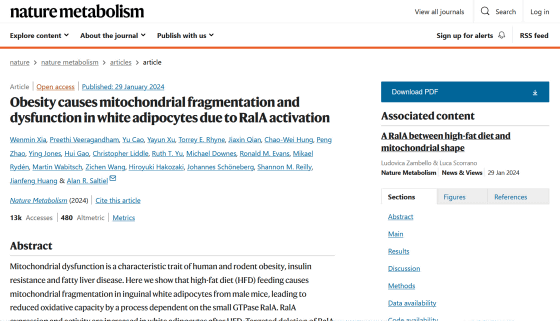When you become obese, it becomes difficult to burn fat and you may fall into a negative cycle where obesity becomes even worse.

The increase in the obese population has become a major problem in modern society, and
Obesity causes mitochondrial fragmentation and dysfunction in white adipocytes due to RalA activation | Nature Metabolism
https://www.nature.com/articles/s42255-024-00978-0

How Obesity Dismantles Our Mitochondria
https://today.ucsd.edu/story/how-obesity-dismantles-our-mitochondria
Obesity Disrupts Mitochondria, And We May Have Figured Out How : ScienceAlert
https://www.sciencealert.com/obesity-disrupts-mitochondria-and-we-may-have-figured-out-how
Obesity refers to a state in which fat cells accumulate excessively, but when you become obese, the ability of fat cells to consume energy decreases, making it even more difficult to lose weight. Previous research has shown that the function of mitochondria, which synthesizes adenosine triphosphate (ATP) , the body's energy source, is impaired in obese people.
Therefore, a research team led by Dr. Alain Saltiel , a cell biologist at the University of California, San Diego, conducted a study to examine the effects on mitochondria by feeding mice a high-fat diet.
The researchers found that when mice were fed a high-fat diet, the mitochondria in their fat cells broke down into smaller mitochondria, reducing their ability to burn fat. Furthermore, they found that this process is controlled by a single molecule called RalA . RalA has functions such as assisting in the decomposition of dysfunctional mitochondria, and excessive activity of RalA may impede mitochondrial function.
The research team also found that feeding mice lacking the RalA-related gene a high-fat diet prevented the weight gain seen in mice carrying the RalA-related gene. 'Chronic activation of RalA appears to play an important role in suppressing energy expenditure in adipose tissue in obese people,' said Saltiel. 'Understanding this mechanism will help promote fat burning and reduce weight loss. 'This brings us one step closer to developing targeted therapies to address this increase and associated metabolic dysfunction.'

This study was conducted in mice, so further research is needed to see if this also applies to humans. However, some proteins affected by RalA in the mouse body were similar to human proteins associated with obesity and
'Energy excess from overeating can lead to weight gain, triggering a cascade of metabolic processes that reduce energy expenditure, further exacerbating obesity,' said Saltiel. 'Comparison of the basic biology we discovered with real-world clinical results highlights that this is also relevant for humans. New treatments. 'Targeting the RalA pathway may be useful in the treatment and prevention of obesity.'

Related Posts:
in Science, Posted by log1h_ik







